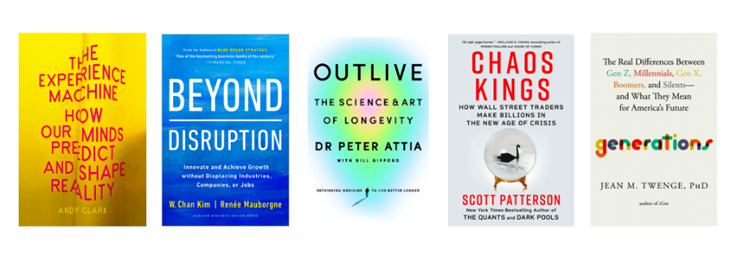Siddy holds a Master’s degree in Economics from the University of Antwerp and a Master's degree in Financial Management from the Vlerick Business School. Passionate by innovation and entrepreneurship, he also participated to an Executive Master in Venture Capital at the Berkeley Haas School of Business. Prior to joining Econopolis, he managed the Investor Relations & Treasury office at Orange Belgium, a telecom company. Siddy also held the position of Telecom, Media & Technology analyst at a large Belgian Asset Management firm. Further, he is also active in the advisory board of StartupVillage and The Beacon, a business and innovation hub in the center of Antwerp focused on Internet of Things and Artificial Intelligence in the domains of industry, logistics and smart city. At Econopolis, he is Portfolio Manager of the Econopolis Exponential Technologies Fund.
Books, Books, Books... the Magic of Summer Reading

A Triggering Thoughts encompasses a specific idea, experience, or event that initiates a thought process within the human mind. These thoughts can have both short-term and long-term effects on a person's behavior and overall well-being. As a firm believer in the power of knowledge and continuous learning, I am delighted to share with you my carefully selected collection of books that I plan to read during the upcoming summer months. In this regard, I hope these books can also serve you as a source of inspiration during your summer break.
Summer is not only a time for relaxation but also an opportunity to reflect, recalibrate, and broaden one’s investment horizons. These five books cover various topics, as such I am keen to explore any new insights, strategies, and perspectives they might offer to help me navigate the ever-changing market landscape. So, dear EconoWeekly reader, as the sun shines brightly and vacations beckon, it might be that the pages of these books also provide you with some thought-provoking and positive insights. The list includes titles published between January and June of this year. If they resonate with you, I would be delighted to hear your feedback. Additionally, please feel free to share your own summer reading recommendations with me.
1/ The Experience Machine – How Our Mind Predict and Shape Reality – By Andy Clark
In a rapidly evolving world overwhelmed with an influx of artificial intelligence models, the human brain stands as an unparalleled prototype for envisioning a personal AI. While this book does not delve into AI itself, it delves into the intricate dynamics of how the brain interacts with the world. The Experience Machine is a fascinating concept that explores the profound ways how our minds predict and shape reality. The idea is that our brains are constantly trying to anticipate what is going to happen next, and then adjusting our perceptions and experiences accordingly. This implies that our reality is not merely a mirror of external circumstances but an ongoing process of construction and reconstruction masterminded by our very own minds.
2/ Beyond Disruption: Innovate and Achieve Growth without Displacing Industries, Companies, or Jobs - By W. Chan Kim and Renee A. Mauborgne
While the names of the authors may not immediately resonate, their bestselling book "Blue Ocean Strategy" is certainly well-known. This groundbreaking work argues that organizations can achieve success by focusing on creating new market space, known as the "blue ocean," rather than engaging in fierce competition within existing markets, the "red ocean". Their latest book, "Beyond Disruption," expands on the traditional concept of innovation by introducing a new approach called nondisruptive creation, which avoids the destructive displacement often associated with disruptive innovations. My interest in this book was piqued due to Microsoft's recent competitive push into Google's search market using their partnership with artificial intelligence pioneer OpenAI, which clearly demonstrates a "red ocean" mentality. However, we firmly believe that the true value of artificial intelligence lies in identifying "blue ocean" opportunities that lead to the emergence of new industries, job creation, and sustainable growth without the disruptive consequences that often accompany such advancements. Especially, considering the alarming comments of some AI-insiders on the treats of AI for our society.
3/ Outlive: The Science and Art of Longevity – By Peter Attia and Bill Gifford
This book delves into the fascinating realm of longevity. Drawing upon a wealth of scientific research, it presents a comprehensive exploration of the factors that contribute to a longer and healthier life. The book is written by a renowned physician and researcher who specializes in longevity, and it provides insights and tips for achieving these goals. The book explores the latest scientific research on genetics, nutrition, exercise, and stress management, and offers strategies for optimizing these factors in order to improve longevity and quality of life. I figure, that as a long-term growth investor in exponential technologies, probably one of the most impactful actions you can take to create value is to prioritize the extension of your life and healthspan. By investing in strategies and practices that promote longevity and well-being, you can enhance your overall quality of life and maximize the potential for future financial gains.
4/ Chaos Kings - How Wall Street Traders Make Billions in the New Age of Crisis – By Scott Patterson
Aside from my fascination with technologies, I have long been captivated by the inner workings of financial markets. From my earliest memories, when envisioning the financial markets, my mind conjures up an image of a vast arena, akin to the grandeur of the Antwerp Sportpaleis, where various factions strive to generate a Mexican Waves. Within this arena, some attempts to create waves may falter and fall short, while others possess the power to invigorate the crowd with a mere flick of a finger. In that respect, it is not a surprise, that I was immediately drawn to this book. In "Chaos Kings" by Scott Patterson, two factions emerge in response to market uncertainty. Nassim Nicholas Taleb leads one faction, which believes that major disasters, Black Swans, cannot be predicted and will always catch us off guard. The second faction, led by mathematician Didier Sornette, relies on complex formulas to detect and defend against looming chaos, viewing them as predictable Dragon Kings.
5/ Generations: The Real Differences Between Gen Z, Millennials, Gen X, Boomers, and Silents--And What They Mean for America's Future – By Jean M. Twenge
In today's fast-paced and ever-changing world, where exponential technologies shape our daily lives, I feel it becomes increasingly important to understand how this impacts different generations. Sometimes, I wonder if everybody is still on board. The back cover of this book promises to investigate the dynamics among the six currently coexisting generations. It delves into the distinctive life experiences that have molded the Silents, Baby Boomers, Gen X, Millennials, Gen Z, and the cohorts born after 2012. Do significant historical events, such as the Great Depression for the Silents, September 11 for Millennials, and Covid-19 for the 2012 cohort, truly define who we are? Jean Twenge, the author of this book is a psychology professor at San Diego State University, she argues that it is the rapid evolution of technology that sets the generations apart. Twenge notes that the younger generation has grown up in a completely different world than their parents and grandparents, with access to technology that their predecessors only dreamed of. This has given rise to a generation that is more connected, more informed, and more plugged in than ever before.
Enjoy your reading!
